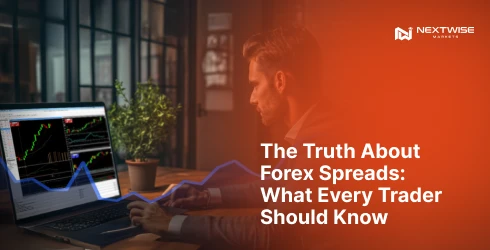The Truth About Forex Spreads: What Every Trader Should Know


If you’ve been trading or researching forex brokers, you’ve probably come across terms like “tight spreads,” “floating spreads,” or “zero spread accounts.” But what do these actually mean? And more importantly, how do spreads impact your trading results — especially over time?
In this blog, we break down everything you need to know about forex spreads in simple, practical terms. Whether you’re just starting out or refining your strategy, understanding spreads is critical to making informed, profitable decisions.
What Is a Spread in Forex?
In forex trading, the spread is the difference between the buy price (ask) and the sell price (bid) of a currency pair.
This gap is how brokers make money, especially when they advertise commission-free trading. Every time you open a trade, you’re essentially paying the spread as a cost — even if no visible fee is shown.
Spreads are measured in pips, and even a tiny difference can add up over time, especially if you’re trading frequently or using large volumes.
Why Spreads Matter More Than You Think
Many traders focus entirely on market direction or strategy, ignoring the cost of entering and exiting a trade. But spreads directly affect your bottom line.
The wider the spread, the more price movement you need just to break even. For example, if the spread is 2 pips, your trade must move at least 2 pips in your favour before you start seeing profit.
This becomes even more important for:
- Scalpers who trade for small pip gains
- High-frequency traders placing dozens of trades per day
- News traders dealing with temporary spread spikes
Ignoring spreads means you’re ignoring your actual trading cost — and that’s a mistake many beginners make.
What Affects the Size of a Spread?
Spreads are not fixed. They change depending on several real-time market conditions. Some of the most common factors include:
Market Liquidity
Popular pairs like EUR/USD usually have lower spreads due to high trading volume. Exotic or less-traded pairs often come with wider spreads because fewer participants are trading them.
Volatility
During major economic news or unexpected events, spreads can widen temporarily. This is the market’s way of managing risk. If you’re trading during these moments, be cautious — even a tight spread can spike without warning.
Time of Day
Spreads tend to be tighter during high-volume sessions like the London and New York overlap, and looser during quieter sessions like late Asian hours.
Account Type
Some brokers offer raw spreads with a small commission (common in ECN accounts), while others bundle the fee into a wider spread (typical in standard or commission-free accounts).
Fixed vs Floating Spreads: Which Is Better?
There are two main types of spreads: fixed and floating.
Fixed spreads remain the same regardless of market conditions. They’re predictable, which is helpful during volatile events, but they are usually set higher than market average to manage broker risk.
Floating spreads, on the other hand, change with the market. They can be incredibly low during stable, high-liquidity periods — sometimes dropping to 0.0 pips — but may widen when volatility increases.
At Nextwise Markets, we offer floating spreads starting from 0.0 pips on our ECN accounts and low, commission-free spreads on our Standard accounts. This model gives traders access to the true pricing of the market, with minimal interference.
How Nextwise Keeps Spreads Tight
Our infrastructure is designed to give traders a pricing edge. Here’s how:
- We connect directly to top-tier liquidity providers across global banks and financial institutions. This allows us to offer real-time quotes with minimal markup.
- Our trading servers are located in high-speed Equinix data centres, ensuring lightning-fast execution. Faster execution means lower slippage — which helps preserve the spread you were quoted.
- We don’t use a dealing desk, so we don’t profit from widening spreads during volatile times. You get a true market environment, free from artificial manipulation.
Spread Awareness = Smarter Trading
Being spread-conscious doesn’t mean you have to obsess over it. But it does mean you should:
- Choose a broker who shows you live spreads before you place a trade
- Monitor spreads during major news events or off-hours
- Understand how your trading style interacts with spread cost
- Compare account types if you’re considering commission-based models
Many traders unknowingly burn a big portion of their profits through high or inconsistent spreads. With just a little awareness, you can reduce your costs, increase your precision, and protect your capital.
Nextwise Makes Spreads Clear and Fair
We’re committed to total transparency in all our pricing — including spreads. When you trade with Nextwise, you get:
- Access to raw or low spreads across all major pairs
- No hidden commissions (unless clearly stated on ECN models)
- Real-time visibility of bid/ask prices
- Transparent market execution with no price manipulation
Our mission is to give traders an honest environment to grow — where your costs are visible, your orders are respected, and your strategy is all that matters.
Final Thoughts
Spreads may seem like a small detail, but in trading, small things add up quickly. Whether you’re a seasoned scalper or just opening your first account, understanding spreads will help you trade more efficiently and confidently.
At Nextwise Markets, we believe every trader deserves clear, fair pricing. That’s why our spreads stay tight, our execution stays fast, and our platform stays true to what matters: your performance.
